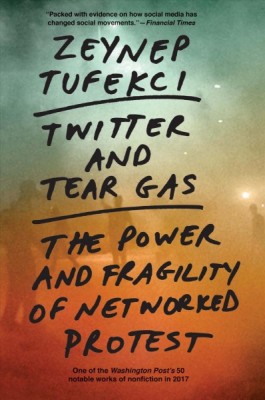| Twitter and Tear Gas: The Power and Fragility of Networked Protest Contributor(s): Tufekci, Zeynep (Author) |
|
 |
ISBN: 0300234171 ISBN-13: 9780300234176 Publisher: Yale University Press OUR PRICE: $15.30 Product Type: Paperback - Other Formats Published: April 2018 |
| Additional Information |
| BISAC Categories: - Computers | Web - Social Media - Political Science | Political Freedom - Social Science | Media Studies |
| Dewey: 303.484 |
| LCCN: 2016963570 |
| Physical Information: 1.2" H x 6.1" W x 9.2" (1.15 lbs) 360 pages |
| Descriptions, Reviews, Etc. |
| Publisher Description: A firsthand account and incisive analysis of modern protest, revealing internet-fueled social movements' greatest strengths and frequent challenges " Tufekci's] personal experience in the squares and streets, melded with her scholarly insights on technology and communication platforms, makes this] such an unusual and illuminating work."--Carlos Lozada, Washington Post "Twitter and Tear Gas is packed with evidence on how social media has changed social movements, based on rigorous research and placed in historical context."--Hannah Kuchler, Financial Times To understand a thwarted Turkish coup, an anti-Wall Street encampment, and a packed Tahrir Square, we must first comprehend the power and the weaknesses of using new technologies to mobilize large numbers of people. An incisive observer, writer, and participant in today's social movements, Zeynep Tufekci explains in this accessible and compelling book the nuanced trajectories of modern protests--how they form, how they operate differently from past protests, and why they have difficulty persisting in their long-term quests for change. Tufekci speaks from direct experience, combining on-the-ground interviews with insightful analysis. She describes how the internet helped the Zapatista uprisings in Mexico, the necessity of remote Twitter users to organize medical supplies during Arab Spring, the refusal to use bullhorns in the Occupy Movement that started in New York, and the empowering effect of tear gas in Istanbul's Gezi Park. These details from life inside social movements complete a moving investigation of authority, technology, and culture--and offer essential insights into the future of governance. |